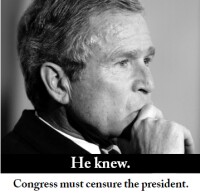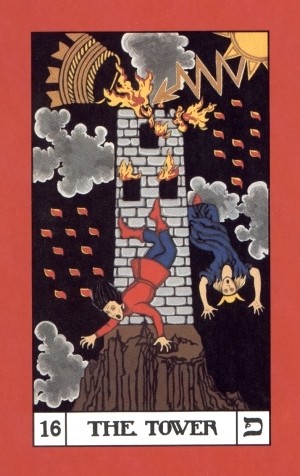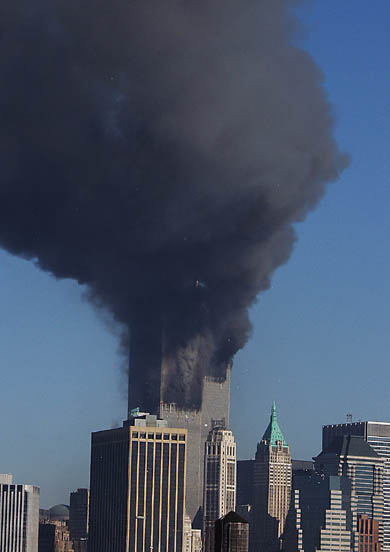Sociological Changes After September 11
![]()
|
|
| |
Back to Index Page |
Sociological American Changes After September 11, 2001
"Do not worry about anything, but in everything by prayer and supplication with thanksgiving let your requests be made known to God. And the peace of God, which surpasses all understanding, will guard your hearts and your minds in Christ Jesus." —The New Testament, Philippians 4:6-7 (NRSV)
"This (9/11) was all planned. This was a government-ordered operation. Bush personally signed the order. He personally authorized the attacks. He is guilty of treason and mass murder… Yes, let me just say that this [Hilton’s $7 billion-dollar lawsuit against the Federal Government with hundreds of the victim’s families involved] is a taxpayers’ class-action lawsuit as well as a suit on behalf of the families… they violated the Constitution by ordering this event." —Stanley Hilton, who was a senior advisor to Senator Bob Dole (R) and has personally known Rumsfeld and Wolfowitz for decades. This courageous man has risked his professional reputation, and possibly his life, to get this information out to people. Read the whole report of Alex Jones’s Radio Show transcript by clicking here:http://www.rense.com/general57/aale.htm
” ‘Matter of Internal Security’, the age-old cry of the oppressor.” —Captain Jean Luc Picard, character of the TV series Star Trek, the Next Generation, Season 3, Episode 11, The Hunted
By Luis E. Prada
 Previous events in the United States history were mainly of a domestic economic consequence or as result of political intervention on wars abroad. The September 11, 2001, event (the destruction of the World Trade Center’s Twin Towers) has brought to the American society a new change not seen in previous history: A change in their sense of security.
Previous events in the United States history were mainly of a domestic economic consequence or as result of political intervention on wars abroad. The September 11, 2001, event (the destruction of the World Trade Center’s Twin Towers) has brought to the American society a new change not seen in previous history: A change in their sense of security.
Americans felt frightened and vulnerable at home, found that they could be attacked and suffer loss of lives and disruption of economy. Before September 11 the average American only saw the consequences of war through TV screens or radio and text. It was something happening to “them” ("others"), in foreign lands. Now Americans experienced it firsthand. The nation’s prowess and sense of invulnerability was challenged big time. This was a shocking reality since all Americans know of the nation’s Military Industrial Complex that they perceived could prevent aggression at home and abroad against US interests by a foreigner military power and yet it could not divert or prevent this attack. Newer generations and the peoples that witnessed the event will never see their sense of security with the same confidence. This will ripple into a long-term effect since the constant threat of terrorist attacks continues being broadcast through media and government.
Americans have always been proud of their liberties that have come down through American history with a high price tag. These rights have been obtained through strife and convincing, fight for civil rights, and as an expression and manifestation of the founding fathers’ ideal goal for the American society as stated in the Pledge of Allegiance and the Constitution’s First Amendment. They set the model for the rest of the world to follow and mark what the future planetary societies will strive for. It is the ideal world where freedom of expression is endorsed by the government. But now, some Americans feel that these same rights place the nation at stake, that these rights can be used as an advantage by terrorist groups infiltrated in the US. As such, it has been triggering an increased surveillance in airports and the proposed lack of privacy in Internet communications and a stronger Federal government’s presence and its potential of prying into private lives. Most Americans feel that America is not any longer the same and are placed in a dilemma between the rights they cherish and the security they need. How to make balance? That’s the question posed for present and future generations.
 Before September 11 Americans saw international events as something complex, and surrounded by unknown factors out of their grasp. They have grown skeptical and cautious after the Internet has spread critical information about international political maneuvers and motives behind every war. Americans today are more informed since the opportunities of free information are open to them. Besides the electronic Web it is the satellite television, which brings news from other countries where military information policies are more relaxed than in the United States. This offers American people, and the world at large, with a second perspective, or a neutral one, in viewing the decision-making policies shaping their lives.
Before September 11 Americans saw international events as something complex, and surrounded by unknown factors out of their grasp. They have grown skeptical and cautious after the Internet has spread critical information about international political maneuvers and motives behind every war. Americans today are more informed since the opportunities of free information are open to them. Besides the electronic Web it is the satellite television, which brings news from other countries where military information policies are more relaxed than in the United States. This offers American people, and the world at large, with a second perspective, or a neutral one, in viewing the decision-making policies shaping their lives.
 Previous generations did not have so much information at their disposal. The average American today feels more informed in studying war and its ramifications and is critical about their government as was not the case of the generations during the forties, fifties and sixties when information came through few TV stations and newspapers. The major broadcast conglomerates give enough information through television and, most importantly, through written text on the Web making an informed person sound “expert” when only is just repeating what was in the stack of articles available. Words such as Taliban, jihad, al Qaeda, and technical and political terms in the domain of Pentagon experts, are now repeated by common American.
Previous generations did not have so much information at their disposal. The average American today feels more informed in studying war and its ramifications and is critical about their government as was not the case of the generations during the forties, fifties and sixties when information came through few TV stations and newspapers. The major broadcast conglomerates give enough information through television and, most importantly, through written text on the Web making an informed person sound “expert” when only is just repeating what was in the stack of articles available. Words such as Taliban, jihad, al Qaeda, and technical and political terms in the domain of Pentagon experts, are now repeated by common American.
What about the bonding of Americans? The September 11 marks a primary event in world’s history with the force of uniting peoples of all creeds and religions both in-house and abroad. It kept the world at shock. How can this evil act happen? Millions of people held prayer chains and the Internet email sites were bombarded with requests for prayer and petitions to politicians. It stop entertainment since the focus was only on the attack and people did not feel the mood for anything else.
Many people around the globe started questioning the way they were managing their own lives, their perspectives and viewpoints, it invited introspection and critique. The focus on economic recession grew stronger and things changed priorities as the conditioned need for compulsive spending in American society was reevaluated. Differences in belief systems did not seem so important anymore and Americans started to perceive themselves as more humane, more tolerant and less materialistic individuals. Some religious beliefs were deepened or even questioned. America as a whole woke up of a slumber. Unification is the theme and a positive consequence, if it can be expressed that way, of the destruction and bigotry that precipitated the attack to the twin towers.
Fears can only be overcome from within. Study this web site and the Truth in it shall set you free of your fears, within and without.
![]()


Leave a Reply